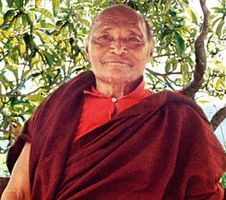Kangyur Rinpoche
Jump to navigation
Jump to search
The printable version is no longer supported and may have rendering errors. Please update your browser bookmarks and please use the default browser print function instead.
ཀློང་ཆེན་ཡེ་ཤེས་རྡོ་རྗེ་
| Wylie | klong chen ye shes rdo rje |
|---|---|
| English Phonetics | Longchen Yeshe Dorje |
Other names
- བཀའ་འགྱུར་རིན་པོ་ཆེ་
- bka' 'gyur rin po che
Alternate names
- Kangyur Rinpoche
Dates
| Birth: | 1898 |
|---|---|
| Death: | January 23, 1975 |
| Place of birth: | khams |
Tibetan calendar dates
| Day | |
|---|---|
| Month | |
| Gender | Male |
| Element | Earth |
| Animal | Dog |
| Rab Jyung | 15 |
About
- Religious Affiliation
- Nyingma
- Familial Relations
- Father of Pema Wangyal, Rangdrol Rinpoche, and Jigme Khyentse
- Teachers
- Rje drung phrin las byams pa 'byung gnas
- Students
- Pema Wangyal · Jigme Khyentse
Other Biographical info:
Links
- Wiki Pages
Buddha Nature Project
- Person description or short bio
- Kangyur Rinpoche, Longchen Yeshe Dorje (Tib. བཀའ་འགྱུར་རིན་པོ་ཆེ་ཀློང་ཆེན་ཡེ་ཤེས་རྡོ་རྗེ་, Wyl. bka' 'gyur rin po che klong chen ye shes rdo rje) (1898-1975) was a great master and tertön from Riwoche Monastery in Kham, East Tibet; his root teacher was Jedrung Trinlé Jampa Jungné. In exile, he lived in Darjeeling, where he met and taught some of the very first western students of Tibetan Buddhism, including Matthieu Ricard. Kangyur Rinpoche is the father of Pema Wangyal Rinpoche, Rangdröl Rinpoche, and Jigme Khyentse Rinpoche. His commentaries on Jikme Lingpa's Treasury of Precious Qualities and Nagarjuna's Letter to a Friend have been translated into English by the Padmakara Translation Group. (Source Accessed Jan 27, 2020)
Expand to see this person's philosophical positions on Buddha-nature.
| Is Buddha-nature considered definitive or provisional? | |
|---|---|
| Position: | |
| Notes: | |
| All beings have Buddha-nature | |
| Position: | |
| If "Qualified", explain: | |
| Notes: | |
| Which Wheel Turning | |
| Position: | |
| Notes: | |
| Yogācāra vs Madhyamaka | |
| Position: | |
| Notes: | |
| Zhentong vs Rangtong | |
| Position: | |
| Notes: | |
| Promotes how many vehicles? | |
| Position: | |
| Notes: | |
| Analytic vs Meditative Tradition | |
| Position: | |
| Notes: | |
| What is Buddha-nature? | |
| Position: | |
| Notes: | |
| Svātantrika (རང་རྒྱུད་) vs Prāsaṅgika (ཐལ་འགྱུར་པ་) | |
| Position: | |
| Notes: | |
| Causal nature of the vajrapāda | |
| Position: | |
